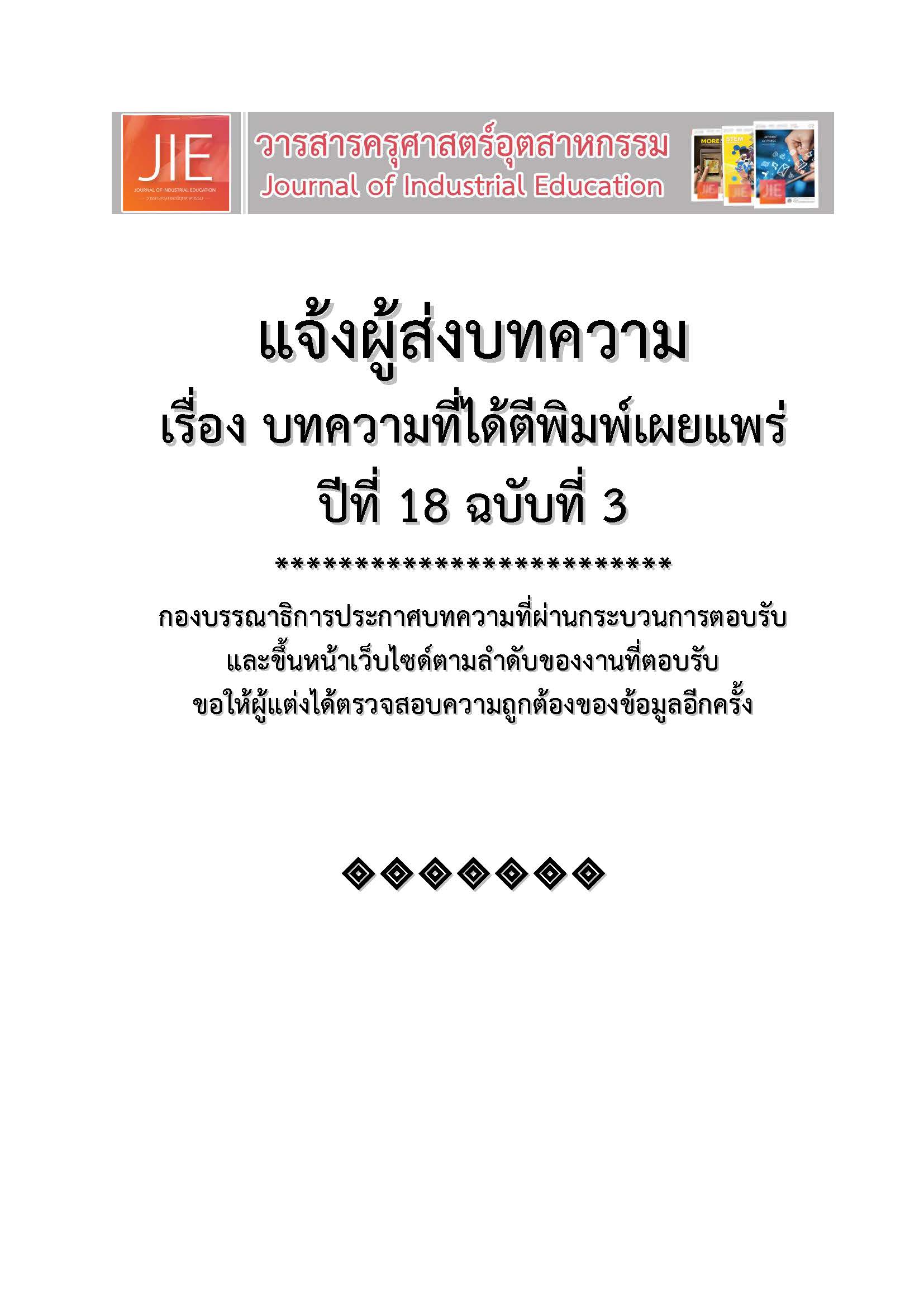RESEARCH AND DEVELOPMENT OF ONLINE GAME – BASED INSTRUTION ON MOUSE SKILLS FOR GRADE 1-3 STUDENTS
Keywords:
Online game-based instruction, Mouse Skills, Quality and Efficiency, Rater Agreement Index : RAI, Nonparametric StatisticsAbstract
This research and development aimed 1) to study the problems and the requirements to solve the problems of using the mouse in computer courses of Grade 1-3 students, 2) to develop Online Game-Based Instruction on mouse skills with quality and efficiency, and 3) To compare the learning achievement of learning skills of students after studying with online lessons. This research was divided into 2 steps. The first step was a study the problems and the requirements to solve the problems of using the mouse in computer courses of Grade 1-3 students. The informant was 5 computer teachers in Meuang Bangpu school, Samut Prakan Province. The second step was the development of Online Game-Based Instruction. The sample group was 21 Grade 1-3 students at Khlong Bang Pu School, Samut Prakarn Province, selected by cluster random sampling. The research instruments consisted of 1) the interview for computer teachers about using mouse skill problem and the requirements to solve the problems of using the mouse, 2) the Online Game-Based Instruction, and 3) the quality assessment of Online Game-Based Instruction on mouse skills and 4) the skill achievement assessment form by observing behavior which the Rater Agreement Index (RAI) of 0.84 Data were analyzed by using statistics; mean, standard deviation and hypothesis testing by Nonparametric statistics which was determined the statistical significance at the .05 level. The research result found that:
Step 1: The study of the mouse skill problems and the requirements to solve the problems of using the mouse of the students in Grade 1-3 found that they are still unable to distinguish clicks and double-click. Neuromuscular development in the hands and eyes are not be joined. Students cannot control the mouse directions on the screen. The teachers need to take many hours to arrange the activities to teach them how to use it properly. This makes them feel stressful to study, and the teachers need the online course like playing the games instead to solve these problems. It will improve their skills to click, drag-drop and double click a mouse. Moreover, the student will get used to using a mouse on the computer as well.
Step 2: 1) The overall quality of Online Game-Based Instruction on mouse skills was at a high level (= 4.43, S.D.=0.16),
2) Online game-based instruction on mouse skills was the efficiency of E1/E2 was 70.24/85.19 which met the determined criteria of not lower than 70/70.
3) The mouse skills after learning by Online Games-Based Instruction met the determined criteria of higher than 70 with the statistical significance at the .05 level.
References
Howard Gardner.Multiple intelligences .(Online). Available URL: http://tip.psychology.org/gardner.html. 12 June 2018.
Thitna Khaem-mani. 2012. 14 How to Teach for Professional Teachers. 11th ed. Bangkok: Chulalongkorn University Printing House.
Surachai Meechan. 2004. Rater Agreement Index (RAI. Songklanakarin J. of Social Sciences & Humanities. 10(2), p.122-123. May - Aug 2004.
Punnee Leekitchwatana. 2015. Educational Research Methodology. 11th ed. Bangkok: Mean Service Supply.
Andy Field. 2013. Didcovering Statistics Using IBM SPSS Statistics. London : Sage.
Pairoj Tranthanakul, et al. 2003. Design and Production of Computer-Based Instruction For E-Learning. Bangkok: Bangkok Media Center.
Pittaya Thaphorn. 2014. Construction of Computer Assisted Instruction Lesson on Basic Computer Network Affecting Learning Achievement of Grade 2 Students. Educational Technology. Ramkhamhaeng university.
Patcharee Jaito. 2015. Development of computer-assisted instruction on video game using word recognition techniques in Thai. For Grade 1 students at Ban Hua Wang School. Educational Technology. Silpakorn University.
Sarinya Watthanaphong and others. 2018. The results of using computer - based computer lesson on mathematics Subject: Two-digit increase of Prathom Suksa 3. Students in Educational Technology and Communication Program, Faculty of Education, Nakhon Ratchasima Rajabhat University.
Kanittha Chandakun. 2010. The effect of using computer assisted instruction on game on English vocabulary of Prathom Suksa 1 students at Wat Chong Nonsi School. Educational Technology. Ramkhamhaeng university.
Amporn Polsit. 2016. Development of learning achievement and scientific process skills of prathom suksa three students by searching for integrated learning and cognitive techniques. Information Journal, Year 15, Issue 1 January - June 2016.
Downloads
Published
How to Cite
Issue
Section
License
"The opinions and contents including the words in papers are responsibility by the authors."
"ข้อคิดเห็น เนื้อหา รวมทั้งการใช้ภาษาในบทความถือเป็นความรับผิดชอบของผู้เขียน"



